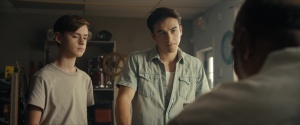Working with the post-production team to ensure the desired effects are preserved and that the mood of the film is maintained. The visuals can set the tone for the film and help us understand how we should feel about whats happening in the story. Thorough understanding of lighting techniques, light color, shade, and manipulation. There is a very vast range between people who barely make it by and people who do incredibly well. Consider the long-term professional relationships between Steven Spielberg and Janusz Kamiski or the Coen brothers and Roger Deakins as examples of this. That being said, for most Cinematographers, it is a career defined by a lifetime of hustling for the next gig and continually networking with others in the industry for future jobs. An eye for detail and a mind for fast invention. Analyzing the screenplay, characters, and story structure and deciding on a visual approach with the director. They need to understand that theyre going to have to work very weird hours. They work closely with directors, art directors, and other production crew members during pre-production in order to create the shots that will make up an individual scene. These skillsnamely the technical onescan be learned in school and/or on set. As a result, a critical part of any Cinematographers career is being able to make connections within the industry and continually hustling for that next gig. As an emerging Cinematographer takes on more responsibility and gains more expertise, theyll likely be asked to work on bigger and potentially more complicated shoots. As early as college or that first PA position, begin making connections.
There is some overlap between these two roles, but generally, a cinematographer is more focused on the artistic aspects of capturing images while a cameraman is more concerned with the operational aspects. Those things come with experience. The easiest way to communicate with the Grip and Electric teams is through making lighting plots and revising them as necessary.
Give it a try. Cinematography is an art form that can be seen in movies, documentaries and television. Cinematography is something that values being able to improvise and create moments of inspiration and insight on the fly. When you get dressed in the morning, if youre the kind of person that can put together an outfit that you like and that other people will likethis is just a metaphorthats a good sign that you have some taste. One must have knowledge of the camera to be used, whether it be using film or a digital camera. From there, many Cinematographers (no matter how long theyve been in the business) will continually educate themselves on the ever-evolving nature of filmmakingfilm to digital, anyone?and how to create the images desired by a Director. Hailing from the South and the Midwest, Nicholas Matthews is an award-winning Los Angeles-based Cinematographer. Obviously, you need knowledge about photography, lighting, and how to work within the confines of a schedule and a budget.
The Producer complains that the Director isnt playing every moment to its maximum; not directing, so to speak. Another thing I tell my students is, they need to realize that what theyre choosing isnt a terribly healthy lifestyle. The first step to becoming a cinematographer would be going through formal training at an accredited university or college program for filmmaking. A cinematographer typically has a range of duties that include: Cinematography is a creative and technical field, so youll have to balance artistic expression with practical considerations to be successful in the field. Theyre all going to make a short film, or a music video, or something like that. A Cinematographers main duty is to represent the story visually, whether its television, a short film, a feature, or anything else thats on the page. He has taught Cinematography at The New School, SUNY Purchase, Maine Media Workshops and guest lectured at NYU and the High School for Film and Television. While there is no direct path to becoming a cinematographer, most professionals in this role have an undergraduate degree in film, video production, cinematography, photography, visual effects, or a closely related field. Then theres the technical part, which is the other side of the brain. Ifyou become a cinematographer, you wont be clocking-off at 5pm every day. The way to achieve this is through hard work, personal endeavour and networking. You have to coordinate with your crew and your managersthe Director, the Producers, post-productionand thats all about communication. Cinematographers use different techniques that include: There is no single type of work that cinematographers do; they can be involved in both film and TV productions as well as music videos or commercials. Its their job to serve the Directors vision but knowing why something is done makes it easier to collaborate. The visual impact of a film is driven by the creative choices a cinematographer makes. Send jobs to 100+ job boards with one submission. Hey, what do you think about trying our new Film Career HelperFilm Career Helper really quick? 2022 CareersInFilm.com | All Rights Reserved | Content may not be duplicated without express written permission. Thats maybe the best benefit of being in film school.  Selecting and sourcing required equipment, tools, and crew members. However, you could study a degree in any discipline and still manage to develop a career in cinematography. In film school, youre going to have Directors, Composers, Editors, a whole plethora of people.
Selecting and sourcing required equipment, tools, and crew members. However, you could study a degree in any discipline and still manage to develop a career in cinematography. In film school, youre going to have Directors, Composers, Editors, a whole plethora of people.
His work has screened at the Nashville Film Festival and Hollyshorts, to name just a couple. In business school, people take classes on how to manage people and how to manage teams. He has also worked with celebrities Ice Cube, Kylie Jenner, Rainn Wilson, Grace Helbig, Paul Scheer, and the band Rise Against. Strong technical knowledge of cameras and the film production process. They work with other members of the crew to ensure that their choices support the directors vision for the film and that each visual element that appears on screen is cohesive and enhances the story. In many ways, film ends up being the cutting edge of photography.
Another great resource is the Ask David Mullen Anything thread on reduser.net. They also depict the color palette, lighting, and camera movement. Cinematographers are also involved in post-production processes. Or theres an Actor who needs a certain freedom, and you need to compromise in a way to allow them to deliver the best performance. Typically if you work features you make a little bit less or a little bit more depending on the budget of the film, which is usually about 1% of the budget. He thrives on collaboration in finding each projects unique voice. That may be true, but because of the considerable technical skillsets that Cinematographers must have to be successful at their job, emerging professionals should consider some type of formal training to become at least proficient at understanding how the many camera and lighting elements work for a given shot, scene, and film. As a result, those seeking a career in cinematography must learn how to budget for those times when they might not be bringing in much or any income.
Coming in as a Production Assistant, one thing that you have to do is be punctual, responsible, and be a good listener. During filming, they ensure all lighting is adequate as well as set up cameras and microphones. Its bad for relationships. You have to be attentive, and you have to be present, because as a Production Assistant, everyone else is more important than you. Its also about staying connected to the moment being capturing and not getting too far ahead or stuck in the past. A filmmaker is someone who conceives, writes, directs, and edits a movie. For aspiring cinematographers, this means developing a broad range of skills in cinematography, storytelling, motion picture photography, and visual effects. The term cinematographer was coined to refer to the person who either shoots or directs films, but it also includes those who work behind-the-scenes to create camera equipment and lighting for films. Best Photography Schools in the U.S. for 2022, 10 Reasons an Online Art Degree May Be Right for You, How to Get Your College Admissions Essay Noticed, Tips for Succeeding in and After Art School, Meeting with the director to discuss the visual style and storyboarding shots, Work with the script supervisor and locations manager to plan each scene and scope out the most effective camera angles, Choosing the appropriate lenses, cameras, and lighting for the project, Coordinating with the art director to create set designs and props that support the visual look of the film, Working with the camera and light crews during production to capture the desired footage and adjust the color and exposure as needed, Collaborating with the sound designer to ensure that the sound and visuals work together, Attend rehearsals with the actors to better understand the framing of each shot, Reviewing footage during post-production and making any necessary edits, Working with the post-production team to create visual effects and titles. You have to understand the nature of photography, both as a photochemical and digital process. The best cinematographers know that they will spend most of their time collaborating with the Gaffer, who is in charge of all lights on set and ensuring they are safe as well as working closely with production designers to get the aesthetic right. Sandi served as Director Of Photography on the Academy Award-nominated motion picture Salaam Bombay, which received the Camera Dor at Cannes. Theres a philosophical and logistical aspect of working as a Cinematographer. Then there are people who work their way up through the Camera Department. You may love a certain Photographer, like Ansel Adams, but when you go to film school, they show you a whole bunch of new Photographers that you can then draw inspiration from. Cinematography is one of the most important aspects in filmmaking, and it can be quite confusing at times. When it comes time to color the footage, a lot of it is out of the Cinematographers control but its important to be present and give creative ideas. Typically employed by production companies, studios, motion picture companies, or television networks often in collaboration with journalists at independent news organizations cameramen are involved in every stage of non-fiction filming. I have a roommate, Im not married, I dont have kids. Youre interfacing with production design, post-production, costume design, hair, makeup, wardrobe, etc. But I would think after 10 years, youre probably not going to make that switch. Think of it as a spigot.
I got out of college in 91 and was shooting my first 35 mm feature, which was released in 99. And its incredibly heavy. Also, you have to be in touch emotionally with what storytelling is. For me, I worked first as a Gaffer. Theres so much technology in cinema. But, how much does my profession pay? Much of this is listening and taking notes before making suggestions. Cinematographers who have achieved this level of success are generally part of the International Cinematographers Guild, which likewise helps to determine base rates for their members. Learn about the key requirements, duties, responsibilities, and skills that should be in a cinematographer job description. Youll be working in Grip, Electric, Camera, or some other discipline within the industry, and you work toward becoming a Cinematographer. Cinematography is the art of capturing images on film. Therefore, these in-depth artistic conversations are integral to making decisions later in the process. They have to add their own artistic intent or else theyre just acting as a lackey for someone elses needs. 
